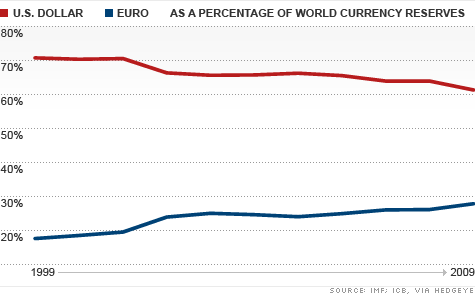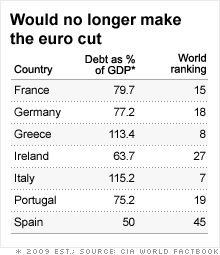
FORTUNE -- In 2007, former Federal Reserve Chairman Alan Greenspan told a German newsweekly that it was "absolutely conceivable that the euro will replace the dollar as the reserve currency, or will be traded as an equally important reserve currency."
As recently as last year, Greenspan's take seemed hardly radical, if not yet realistic. Since the currency's launch on January 1, 1999 (though it only began to circulate as a currency in 2002), the euro has become the world's second largest reserve currency, after the U.S. dollar. In fact, the euro has consistently seized reserve share from its main competitor, increasing its percentage from 18% to 28% over its decade of existence.

About 330 million Europeans use the euro every day, and 175 million others used euro-pegged currencies. Yet as the chart above shows, all this still put it a long way from surpassing the dollar, even before the European soverign debt crisis started this year.
But the crisis has made assertions like Greenspan's seem, well, a little exuberant. There's no chance of the euro going under -- the European Central Bank's recently approved €750 billion plan to backstop European debt seems to signal that the eurozone will protect its common currency at all costs. (The plan, by the way, was called a $1 trillion bailout when it was announced last month -- but continued weakness has left the value of the package at around $921 billon at the moment.) The irony is that the bailout plan has also exposed serious structural flaws in the euro framework.
Euro countries: in a club that wouldn't have them as members
The Maastricht Treaty (1992), which established the framework, mandated that no country would be eligible for a bailout. The measure was meant to ensure consequences for bad fiscal policy and protect the eurozone's broader fiscal order. Meanwhile, the Stability and Growth Pact, which grew out of the treaty, required all eurozone nations to keep their budget deficits as percentages of GDP below 3%, debts as percentages of GDP below 60%, and inflation over the trailing twelve months to less than 3.2%. But as the table on the left shows, some of the eurozone's most prominent nations flagrantly violate those terms.
It should come as no surprise that the eurozone has willfully ignored its own rule-making. European economies are too interconnected to permit anything else. Most nations within Europe borrow from, and lend to, each other: Spain holds one-third of Portugal's debt; Spain owes Germany $238 billion; Italy owes France more than twice that. So while the Maastricht Treaty requires the eurozone to direct Greece to restructure its debt, most major banks within the eurozone are holders of Greek debt and would distinctly feel the pain of any Greek debt restructuring.
Part of the problem: finance without politics
The sovereign debt crisis has exposed the ineffectiveness of a one-size-fits-all monetary policy for a continent with significantly disparate economies. Spain shapes its monetary policy to combat its 20% unemployment; Germany's works to keep its economy from heating up. The absence of a stronger political union to manage the divergent economic goals of the member nations destines the Maastricht Treaty to regular flouting by its members.
Nowhere has this difference been more clear than in the news today that ECB chairman Jean-Claude Trichet is under fire from stronger eurozone countries, including Germany's central bank, for his decision to buy debt from Greece, Spain, Italy and Portugal.
The stronger eurozone countries worry the move will exacerbate inflation. The weaker ones obviously need the support of the ECB to make their debt cheaper. And the international community, as the Wall Street Journal Brussels blog notes above, is pondering whether the ECB is still committed to fighting inflation and keeping its credibility as an inflation fighting institution intact given the move. The argument over the Trichet's leadership of the ECB tears at the very collegiality that allowed the euro to come into existence. But it doesn't tear at the euro itself. There's too much vested in the system, intellectually, financially, for Europe to abandon it, at least for now.
Is the euro under threat of extinction? Not any time soon -- the ECB's bailout package makes sure of that. But the package does undermine the possibility of the euro surpassing the U.S. dollar as the world's reserve currency. In fact, it creates the likelihood of the euro's revalue and a continuation of its slide toward -- and beyond -- an all-time low versus the U.S. dollar. Looks like Greenspan was wrong. Again.
--Daryl G. Jones is the Managing Director of Risk Management at Hedgeye, a research firm based in New Haven, Conn. ![]()



| Overnight Avg Rate | Latest | Change | Last Week |
|---|---|---|---|
| 30 yr fixed | 3.80% | 3.88% | |
| 15 yr fixed | 3.20% | 3.23% | |
| 5/1 ARM | 3.84% | 3.88% | |
| 30 yr refi | 3.82% | 3.93% | |
| 15 yr refi | 3.20% | 3.23% |
Today's featured rates:



| Company | Price | Change | % Change |
|---|---|---|---|
| Ford Motor Co | 8.29 | 0.05 | 0.61% |
| Advanced Micro Devic... | 54.59 | 0.70 | 1.30% |
| Cisco Systems Inc | 47.49 | -2.44 | -4.89% |
| General Electric Co | 13.00 | -0.16 | -1.22% |
| Kraft Heinz Co | 27.84 | -2.20 | -7.32% |
| Index | Last | Change | % Change |
|---|---|---|---|
| Dow | 32,627.97 | -234.33 | -0.71% |
| Nasdaq | 13,215.24 | 99.07 | 0.76% |
| S&P 500 | 3,913.10 | -2.36 | -0.06% |
| Treasuries | 1.73 | 0.00 | 0.12% |
|
Bankrupt toy retailer tells bankruptcy court it is looking at possibly reviving the Toys 'R' Us and Babies 'R' Us brands. More |
Land O'Lakes CEO Beth Ford charts her career path, from her first job to becoming the first openly gay CEO at a Fortune 500 company in an interview with CNN's Boss Files. More |
Honda and General Motors are creating a new generation of fully autonomous vehicles. More |
In 1998, Ntsiki Biyela won a scholarship to study wine making. Now she's about to launch her own brand. More |
Whether you hedge inflation or look for a return that outpaces inflation, here's how to prepare. More |